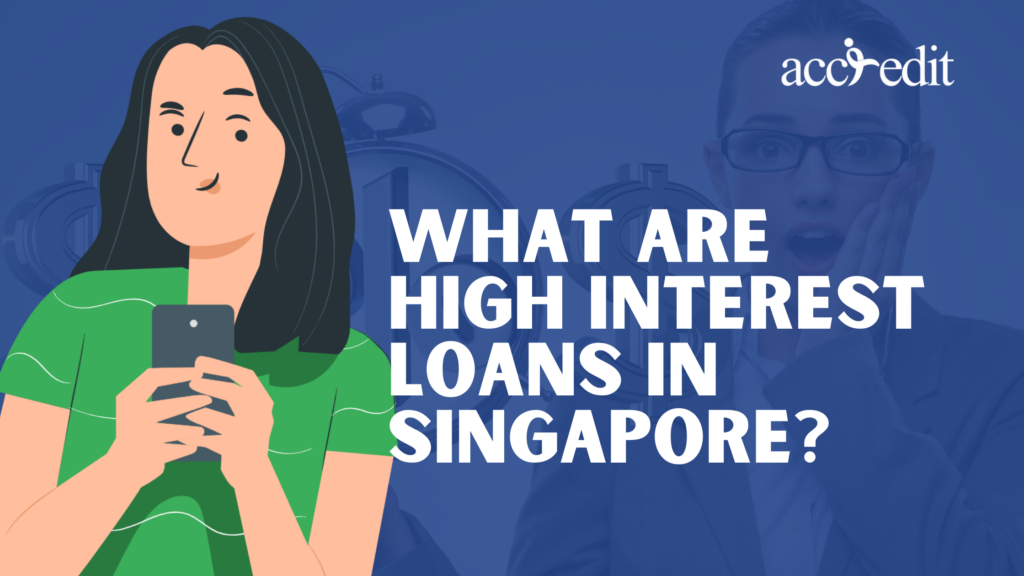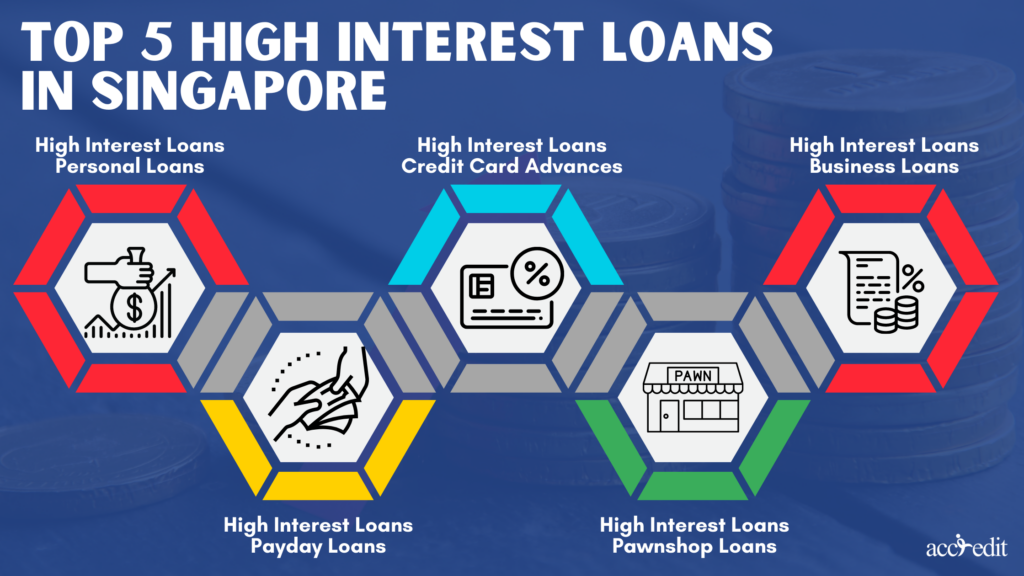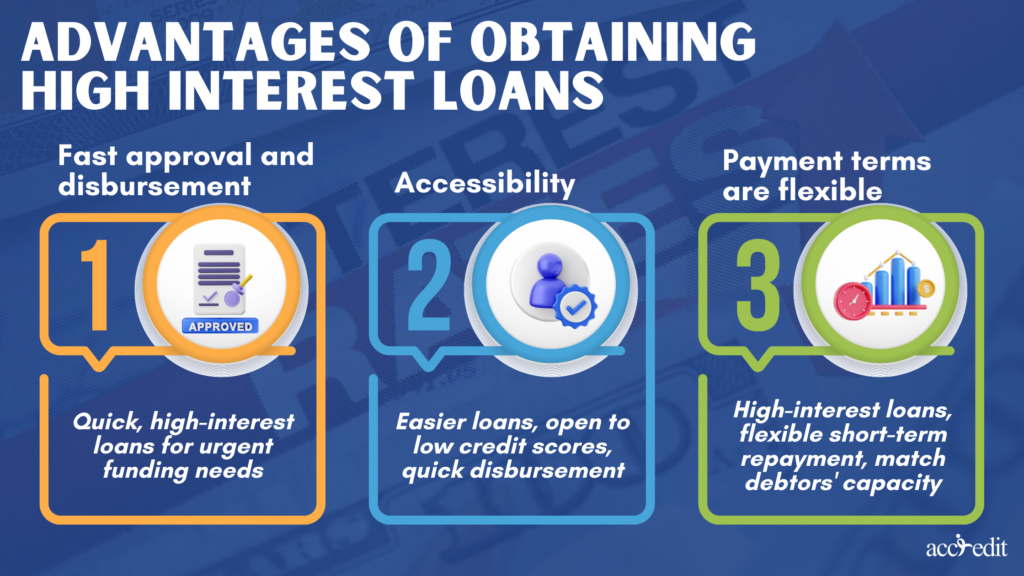
Singapore is among the most successful financial hubs in the world. With this, it presents various financial products to its community, including high interest loans in Singapore.
The concept of borrowing money from lenders isn’t new. As a result, when a person experiences difficulties due to strained finances, getting a loan is a common approach to resolving such predicaments.
However, a borrower might need to learn essential details about a loan because of its diverse functions and features. It mainly involves the most crucial aspect of loans: the high-interest rate.
This article will discuss the top five high-interest types of loans you can utilise that suit you best. Plus, the advantages worth considering that you could experience from these loan types.
Top 5 High Interest Loans in Singapore

Loans with high-interest rates are generally above the current market rates in a country. These types of debts are often promoted to businesses or individuals who have acquired poor credit scores or have a limited financial history.
If a borrower isn’t careful handling their high-interest debt, it’ll likely lead them to monetary distress and ruin. The soaring rates and fees will make it challenging to repay the loan.
To provide you with more awareness on the matter, here are the commonly recognised high interest loans in Singapore:
1. High Interest Loans Personal Loans

Banks and licensed moneylenders in Singapore are among the country’s most trusted and incredibly reliable lenders. Traditional banks offer personal loans, and so do licensed moneylenders.
Banks are stringent when it comes to loan applications. Thus, people in Singapore prefer licensed moneylenders as viable alternative lenders when taking out a personal loan. These lending businesses must pass specific exams and qualifications and have the professional capacities and capital to grant lending services to their borrowers.
Personal loans are unsecured loans that may be utilised for many purposes. Borrowers could use it for emergency expenses, travel funds, home renovations, or debt consolidation.
Even when it’s among the top high-interest loans in Singapore, people still prefer it to other loans. The estimated interest rates from licensed moneylenders are 1% to 4% max per month.
All personal loan transactions from banks and licensed moneylenders are under the regulations of the Ministry of Law and Monetary Authority of Singapore.
The relevant authorities encourage borrowers to avoid unlicensed moneylenders, mainly when presenting personal loans. Unlicensed moneylenders impose an extremely high interest that could reach beyond 20% per month. Thus, MAS and MOL have taken severe measures to fight off these Ah Longs via:
Enforcing strict penalties:
Borrowers may file a complaint or report against the unlicensed moneylender. Once proven guilty, they’ll be subject to strict penalties, which include fines and imprisonment.
The expected maximum penalty for operating unlicensed moneylending is a $300,000 fine, up to four years imprisonment, and six strokes of the cane.
Empowering Singapore’s police authority:
MAS, MOL, and the Singapore Police Force are working closely and hand in hand when investigating and prosecuting unlicensed moneylenders. The police force has the authority and power to arrest and charge individuals engaging in unlicensed moneylending activities in the country.
Encouraging public awareness:
The Monetary Authority in Singapore, with the Ministry of Law, often conducts a public education campaign. It’s to raise more awareness regarding the dangers associated with having transactions from an unlicensed moneylender. The campaign aims to assist consumers in identifying and avoiding illegal moneylenders.
Conducting regular inspections:
MAS or MOL may accredit some lenders in Singapore but sometimes breach the laws and regulations. Thus, the legal authorities regularly inspect licensed moneylenders to ensure law compliance and that borrowers are treated fairly.
Unlicensed moneylenders operate beyond the MAS’ jurisdiction. It would be difficult for borrowers to deal with the high-interest loans from these entities due to their disassociation from Singapore’s finance laws. As a result, consumers are mostly encouraged to borrow only from licensed moneylenders for regulated activities and guaranteed protection.
2. High Interest Loans Payday Loans

Famous short-term debt borrowers can apply for in Singapore is payday loans. It’s known for its small loan amount disbursement and must be repaid a few weeks after or within the next salary.
Payday loans usually do not require credit scores upon loan application. Thus, it became widely recognised among borrowers enduring bad credit or lacking credit history to present to lenders.
These loans are beneficial in terms of quick funding. Borrowers may use payday loans to bridge monetary gaps and use them for emergencies or pay unexpected expenses. As a result, individuals who genuinely need fast and easy cash would opt to take out a payday loan.
However, its distinguished drawback is its high monthly interest of up to 4%. The repayment situation could spiral out of control if the borrower fails to pay the loan on time.
Lenders typically impose post-dated cheques or bank account access; thus, you must prepare your PDC before applying. But some lenders accept payments via GIRO, so it’s best to discuss it further with your chosen licensed moneylender.
The Monetary Authority of Singapore (MAS) and the Ministry of Law have implemented specific measures to regulate payday loans to protect consumers and legal lenders, which involve:
Capping on interest rates:
Licensed moneylenders are encouraged under the law to regulate interest rates per the Moneylenders Act and regulations from MAS and MOL. Among these is capping on interest rates, only reaching a maximum percentage of 4% per month.
The licensed moneylenders’ monthly interest is far lower than other payday loan providers.
Loan amount limitations:
Every person has different financial needs. But the law in Singapore imposes a maximum loan amount that borrowers may take out. It guarantees that the borrower’s income and financial situation won’t suffer as they obtain a loan.
Moreover, a debtor’s creditworthiness is assessed to ensure repayment capabilities.
Regulating charges:
Licensed moneylenders in Singapore cannot impose charges according to their preference. They’re only authorised to charge specific fees, such as administrative and late payment charges.
Additional fee charges for early repayments are also not permitted.
Educating and guiding borrowers:
All licensed moneylenders in the country must provide borrowers with further information and guidance regarding loan terms and conditions. Such information and details include fees and consequences of dealing upon defaulting on the loan.
Fulfilling advertising guidelines:
The Monetary Authority of Singapore and the Ministry of Law have imposed advertising guidelines for licensed moneylenders in Singapore. For example, they’re only permitted to advertise on official business sites, outside their offices, and in business directories in Singapore.
Soliciting their loan products and services to Singapore’s community via SMS, social media platforms, newspaper, and other means is strictly prohibited.
The intervention and monitoring provided by MAS assist the borrowers and licensed moneylenders in upholding the strict regulations. Payday loans are short-term loans and must be treated as it is.
It isn’t a viable solution to providing long-term monetary assistance to borrowers. It’s a high interest loan that grants the quickest cash availability.
3. High Interest Loans Credit Card Advances

The loan product that may assist credit card holders in Singapore is credit card advances. It permits borrowers to obtain money against their current credit card limit.
A high interest loan like this is estimated at 25% per annum. Fees may apply; thus, talk to your lender regarding additional charges. Be mindful of your debt-to-income ratio to ensure your credit score won’t be affected when you’re about to take a credit card advance.
It’s an advantageous loan option if borrowers have already exhausted every possible means to fix their financial struggles. It’s considerably the last resort.
MAS continued to aid its communities and implemented various measures that help regulate credit car advances, including:
Interest rates and fee capping:
MAS implements a capping on interest rates per annum. These are estimates on credit card advance interest rates, which include upfront fees of up to 6% of the amount advanced and additional daily interest of up to 0.07%.
The APR may reach up to 28.9% chargeable every day.
Cost and risks disclosure:
Credit card holders must obtain specific information on risks and costs associated with cash advances. It’s the primary requirement for credit card issuers in Singapore. They should disclose the interest rate, fees, and probable consequences for not paying the loaned amount advanced.
Setting designated minimum monthly payments:
Credit card issuers in Singapore set the monthly payments of cash advances. A credit card advanced applicant can expect the amount to be higher than the interest and fees charged to the loan option.
Regulated cash advance amount:
MAS regulates limitations regarding overall cash advance amounts, and credit card issuers must implement them. The calculation would be the percentage of the cardholder’s credit limit.
Providing credit counselling:
Credit counselling is a crucial approach credit card issues must provide to their cardholders. It’s a means to assist and guide cardholders who’ve acquired cash advances and possibly experiencing finances.
4. High Interest Loans Pawnshop Loans
A high-interest loan in Singapore that’s also secured is a pawnshop loan. Borrowers will pledge their items, such as electronic gadgets, jewellery, and other valuable possessions, as collateral. The loan’s total amount is obtained from the item’s appraised value percentage.
The interest charged by pawnshops varies greatly, typically around 1% up to 1.5% each month. It’s objectively much lower than payday loans. Nonetheless, the effective interest rate may include additional charges: handling, storage, and appraisal fees.
Due to their higher borrowing costs and risk of losing collateral, pawnshop loans are deemed high-interest. Upon the event of default, the pawnshop will seize and sell the collateral to compensate for the money they’ve lent the borrower.
The Monetary Authority of Singapore (MAS) also oversees different measures in regulating Singapore’s pawnshop industry through:
Licensing requirements:
Singapore’s pawnshop industry must be accredited and licensed by the Ministry of Home Affairs and comply with regular police inspections. The protocol assists in ensuring pawnshop operations are indeed safe and transparent.
Limiting loan amounts:
Pawnshop maximum loan amounts are set by MAS, based explicitly on the collateral’s value. It’s effective in ensuring overborrowing won’t occur, that’ll result in financial difficulties.
Caps on interest rates:
MAS imposed strict guidelines concerning chargeable interest rates. The maximum interest allowed is 1.5% per month, considerably lower than other high-interest lenders in Singapore.
Requirements disclosure:
Transparency and clear information must be provided to all pawnshop loan consumers, associated explicitly with terms and conditions. The approach assures consumers that the costs and risks connected with the loan are legitimate. Granting them opportunities to make informed decisions before signing the agreement.
Collateral handling prerequisites:
MAS imposes a regulation that all pawnshops must handle every pledged item responsibly and securely. It’s to prevent any occurrence of collateral loss or damage. Pawnshops should additionally provide a detailed description of the pledged item and the borrower’s accurate value.
5. High Interest Loans Business Loans
These are helpful financial products that small and medium-sized enterprises (SMEs) may benefit from. It’s incredibly efficient in assisting SMEs in growing their businesses. Yet, as incredible as it is, it has high-interest rates, particularly for high-risk borrowers.
A borrower may seek business loans from banks, financial institutions, and licensed moneylenders. Its coverage is wide-ranging and assists via various forms, such as term loans, revolving credit facilities, and invoice financing.
A business loan’s interest rates would vary on the lender, loan amount, tenure, and borrower’s creditworthiness. But, its high-interest rates can range between 3.2% to 30% per annum and are notably higher.
MAS mitigates risks from high-interest business loans through these particular measures:
Industry’s guidelines:
The financial institutions’ guidelines motivate business loan providers to be responsible lenders, assess borrowers’ creditworthiness, and provide transparent and clear details on loan terms and conditions.
Risk-based capital requirements:
It’s a requirement for financial institutions proffering business loans to hold a minimum range capital-based risk profile of their lending portfolio. It assists in ensuring financial institutions are adequately prepared to absorb possible losses from loan defaults.
Caps on interest rates:
The Monetary Authority in Singapore sets interest rates capped for an unsecured business loan. The financial institution’s updated cap is at 13% annually, preventing businesses from obtaining exorbitant interest rates.
Requirements are disclosed:
Following the law, financial institutions must proffer transparent and clear information and details associated with the loan terms and conditions. It offers SMEs opportunities to become fully aware of the probable costs and risks of the loan product before pursuing it.
Credit bureau reporting:
MAS legally encourages financial institutions granting business loans to report SME lending data to credit bureaus. It’s an approach to guarantee SMEs’ credit history, relevant for creditworthiness assessment and financing for fair and reasonable terms.
These are Singapore’s current high interest loans. As the interest charges are higher than other financial products, would there be any advantages to reap?
Advantages of Obtaining High Interest Loans

All loan products have varying advantages. Thus, it’s up to the borrower to assess whether the possible benefits are worth the high-interest risks.
These are the financial products that may be excellent options in times of extreme financial need, and here are some advantages you’ll get from high interest loans in Singapore:
Fast approval and disbursement:
Individuals who must immediately obtain funding from a loan can opt for these high-interest loans. It’s because these loan types are usually processed at a quicker speed with minimal documentation requirements.
As a result, these are attractive options for individuals seeking immediate cash for their needs.
Accessibility:
Unlike traditional loan products with stringent eligibility criteria, documents required, and periods awaiting loan disbursement, that isn’t the case for these types of debts. For one, individuals with poor credit scores may apply for it, thus, providing financial assistance to those requiring it.
Payment terms are flexible:
Although the loan products have much higher interest charges, many lenders offer flexible repayment options. The repayment plans can be short-term and customisable, easily fitting the debtors’ needs and financial capacities.
Limitless use of purpose:
Another advantage regarding these debts is borrowers can use them for any purpose. It may be for establishing businesses, paying for unexpected expenses, vacations, trips, or other projects. There’s no limit.
These are the advantages accessible through high-interest loans in Singapore. Here are further tips to ensure you’ll acquire a faster loan process and approval from the lenders precisely when:
- You improve your credit score by providing you commit and repay debts on time
- Compare the best lenders in the country via their interest rates and deals
- Avoiding predatory lenders by checking their licenses and records online.
- Negotiating terms to acquire favourable outcomes such as lower interest charges or more extended repayment periods
- Exploring alternative financing options like grants, government-backed loans, etc.
Overall, the high-interest rates for a loan in Singapore are, without any doubt, beneficial financial products for acquiring quick and easy financing. It’s always crucial to analyse and consider the benefits of the loan products before making a final decision.
As you understand the risks and proper management of high-interest loans, you can reach informed choices that’ll assist you in attaining your specific financial goals.

